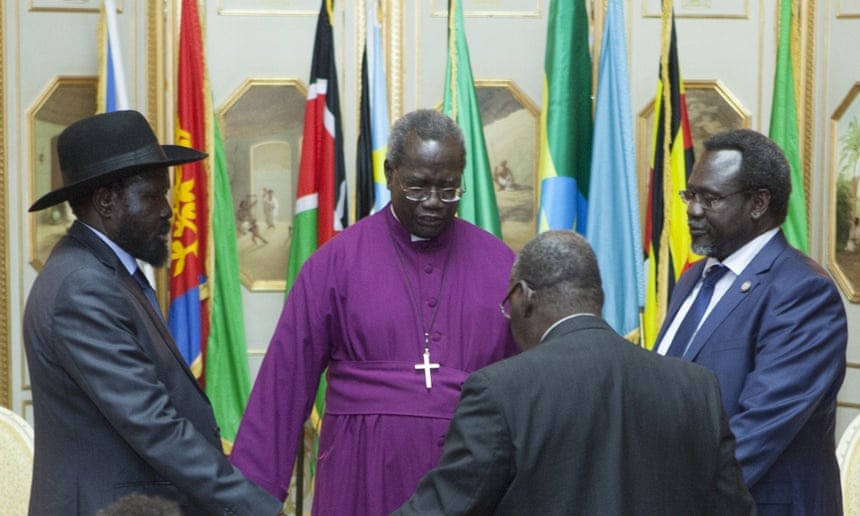Waning patience over repeated failure of ceasefire agreements prompts US to propose global travel ban and asset freeze
Date: Wed, 25 Feb 2015 21:44:17 +0100
South Sudan sanctions loom as US presents draft UN resolution
The resolution is a signal the US is losing patience with the repeated failure of the two sides “to put their narrow political and economic agendas aside” and stop fighting.
Similar language emerged from the UN’s peacekeeping chief, who accused both the government and rebels of “a serious failure of leadership that remains focused on its pursuit for power rather than care of its people”.
The US measure, which was submitted to the UN security council on Tuesday, came a day after the latest round of negotiations to end South Sudan’s 14-month civil war began in the Ethiopian capital Addis Ababa.
Seven ceasefires have failed to take hold in South Sudan, which erupted into violence in December 2013 after President Salva Kiir accused his vice-president, Riek Machar, of plotting a coup.
Tens of thousands are thought to have died in the fighting, which has displaced 1.5 million people internally and forced another 480,000 into neighbouring countries. Although famine was averted last year, the UN estimates 3.9 million people will face food insecurity in South Sudan in 2015, with 2.5 million becoming severely food insecure.
The draft resolution raises the possibility of an arms embargo on the world’s youngest country – a measure strongly backed by European countries despite concerns that the ban would penalise Kiir’s forces more than Machar’s rebels.
“The political leaders have repeatedly failed to put their narrow political and economic agendas aside in order to find political solutions that could bring a measure of stability,” a US official told AFP.
“In light of that, our goal is to work with our partners to move forward with a sanctions resolution that will lay the groundwork for imposing costs on those who continue to fail to work toward a solution.”
Asked why the resolution did not explicitly call for an arms embargo, a US official told Reuters the idea was to take an “incremental approach”, gradually increasing pressure on the warring factions.
Earlier this month, Valerie Amos, the UN under-secretary general for humanitarian affairs and emergency relief coordinator, backed calls for an arms embargo.
“Anything that takes weapons off the streets, out of countries and out of communities will help us because ultimately for us it’s about bringing peace,” she told the Guardian. “If there are no weapons, it’s harder for people to fight, peace will come sooner and we can get more aid to the people who so desperately need it.”
Despite the latest US moves, however, the UN’s peacekeeping chief, Hervé Ladsous, told the security council “the likelihood that either side could soften its stance remains low”.
He said the peace talks had been marred by “a serious failure of leadership that remains focused on its pursuit for power rather than care of its people”, adding: “There is now an urgent need to reinforce the mediation efforts, as well as to impose consequences on the parties if they fail to show willingness to compromise, and continue engaging in a conflict that will result in further loss of innocent lives.”
Regional negotiators have now set a deadline of 5 March for Kiir and Machar to reach a final peace deal that includes a transitional unity government.
A second deadline of 1 April has been set to launch preparations for the transition, which should be completed no later than 9 July.
US officials described the two deadlines as milestones and said the security council would decide at those times whether to move forward and impose sanctions, once the resolution is adopted.
A vote on the US-drafted resolution at the security council could take place next week, diplomats said.
The draft resolution threatens sanctions against those involved in recruiting child soldiers, as well as those who block deliveries of humanitarian aid and leaders who fail to advance peace negotiations.
It provides for a panel of experts to be established along with a sanctions committee that would report to the security council on the situation in South Sudan.
Although the US announced plans in November to present a sanctions resolution, the measure ran into resistance over the arms embargo provision and shifting positions from African governments in the region.
More than two dozen armed forces – including government soldiers and allied militia backed by Ugandan soldiers on one side, and a range of rebel factions on the other – have been battling since December 2013.
Fighting has raged this month in the northern Upper Nile state, with the government warning that rebel forces were splintering, making any negotiations increasingly complicated.
Last week, the UN children’s agency, Unicef, said that at least 89 boys – some as young as 13 – had been kidnapped by gunmen as they were preparing to sit school exams in the town of Wau Shilluk in the north of the country.
Both sides have been accused of using child soldiers. Unicef estimates that at least 12,000 children have been recruited.
South Sudan, which won independence from Sudan in July 2011, is also facing a worsening health crisis. On Tuesday, the World Health Organisation (WHO) appealed for $90m (£580m) of additional funding to provide vital health services to about 3.35 million people in South Sudan. The WHO said the disruption caused by months of fighting had weakened health systems and led to recurrent outbreaks of communicable diseases. It also noted that more than 80% of services are now being provided by international organisations.
